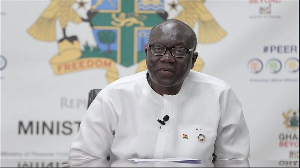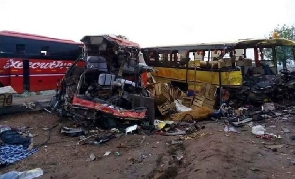The Agbogbomefia of Asogli State and President of the National House of Chiefs, Togbe Afede XIV has disclosed that the insistence of people in the Volta Region to be included in the referendum for dividing the region into two is only to uphold the 1992 Constitution.
Togbe Afede said the people of Asogli, brothers and sisters from Southern Volta and other peace-loving Voltarians are raising red flags because of the unconstitutional approach that had characterised the process in the attempt to create the proposed Oti Region and called on the authorities to do the right thing.
“The framers of our Constitution have done a good job. They have given us a clear roadmap for the creation of new regions and the alteration of boundaries of regions. We must, as I have advised before, not bastardise it, but respect it in the interest of peace and unity.”
Togbe Afede was addressing ‘Ewefiawo fe Haborbor’ (Association of Ewe Chiefs) led by the President, Togbe Dzogbede V and representatives of Anlo Youth led by the leader, Mayor Agbleze on Saturday, October 20. Their mission was to pay a courtesy call on Togbe and to raise some concerns including the partitioning of the region.
He said the Commission of Enquiry set up to investigate the substantial demand for new regions in the country did a shoddy work citing disregard for petitions to extend its public hearings to other parts of the regions affected, suppression of petitions opposing the creation of new regions or inclusion in new regions, and withholding the final report from the public.
Togbe Afede said the creation of Oti Region and other new regions involves the alteration of existing boundaries and so, asked that the Authorities ensure the referendum covers other parts of the affected regions.
He described as “disingenuous” and “dangerous” examples cited by President Nana Akufo-Addo of Scotland, Eritrea, South Sudan and Trans-Volta Togoland to support the referendum to be held only in areas calling for the new regions.
“The use of these examples is creating a dangerous precedent, with implications for the survival of our country. Will Ghana allow any part of the country to vote alone to decide their independence as was done in Scotland, Eritrea, South Sudan, Trans-Volta Togoland, etc?”
President Akufo-Addo few days ago while addressing the chiefs and leaders of the Ketu South Traditional Council at the Jubilee House, described as unfounded and needless, the agitations generated over who should vote and should not vote in the Volta Region in the referendum to be held later in December to create the proposed Oti Region.
He said it had always been those with the demands, giving among other instances, the referendum of the Trans-Volta Togoland.
“Here in our own country, Trans-Volta Togoland people in Keta did not vote because they were part of the Gold Coast Colony. It was the people in Western Togo, northern part of Ghana who voted in that referendum. The people in Kyebi where I come from did not vote in that referendum because it was not about them.”
Togbe Afede XIV emphasised that the people are not against the creation of new regions but want due process. He called on all Ghanaians to study the Chapter 2 of the 1992 Constitution which spells out the processes in creating new regions.
He expressed hope that the courts will do their best to uphold the truth in the matter to protect the sanctity of the law as the issue is not about Volta but the future of Ghana.
Togbe Afede in a pose with the delegation at Asogli palace, Ho It will be recalled that the intended division of Volta Region sparked protests from various groups in the region latest being, One Volta Group, a development and advocacy organisation with membership in the USA, Canada, UK and Ghana.
The Group debated that the reasons for the demand for Oti Region “are porous, weak and unsustainable by any logic or reason.”
The group in a release felt the decision was political insisting that such decision on a region of more than 2.5 million inhabitants could not be decided by petitioners “who constitute less than 3 per cent.”
General News of Monday, 22 October 2018
Source: voltaonlinegh.com













